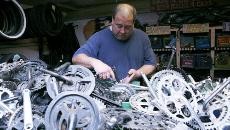While most sustainability advocates focus on projects with expensive start-up costs like solar panels and water harvesting, one local Tucson business believes the real answer may be between your legs.
Community bike shop BICAS has been involved in restoring and recycling bicycles and bike parts for years. Because it eliminates the carbon emissions and fuel cost of driving, bicycling has been touted as one of the simplest ways for concerned community members to reduce their consumption.
“”Unfortunately, one of the byproducts of bikes is that there are a lot of parts that just break,”” BICAS employee Alex Noelke said. “”We don’t like the idea of just throwing parts away, getting rid of parts or replacing parts, because that just fuels the consumerism around bikes that BICAS tries to attack.””
As one maneuver in this attack, the bike shop began a series of Friday “”Free Art Workshops””, which are open to the community at large. They’ve created many of the artistic bicycle racks and trash containers scattered throughout the city, taking the “”green”” aspects of bicycles one step further.
Participants take bike parts that are no longer serviceable and create works of art. These projects can range from junk metal robots, to recycled rubber journals, to bike-part jewelry.
“”By taking all of this scrap metal and turning it into sculptures, and taking all of these strange intricate parts and turning them into jewelry, we can show that these are everlasting parts. We can make things out of them,”” Noelke said.
However, if you want your bike fixed at this particular bike shop, you’ll have to be willing to get your hands dirty.
BICAS encourages people to learn their own bicycle maintenance through the classes and open workshops that they offer; that way, fixable parts don’t get tossed to the curb.
“”This isn’t some totally alien machine that they can’t comprehend,”” Noelke said. “”When we promote sustainability, we try to take away that doubt that a lot of people have, that they can’t fix it for themselves.””
Lon Huber, research associate for Arizona Research Institute for Solar Energy and founder of the ASUA Sustainability ACTION committee, agrees that environmental concerns are an issue for more than just the scientists.
He said the ACTION committee’s goal is to take ideas from the campus think tank, test them out and prove to the outside world that the environmental crisis can be solved through innovation and hard work.
“”If you’re talking about environmental sustainability, to me it means using resources in a manner so that future generations have the same opportunity to utilize those resources,”” Huber said.
The UA Union Gallery sees the benefit of involving the community in the effort to combine environmental concerns and art.
“”I love the idea of using art as a way to educate people and a way to transform objects,”” said Holly Brown, curator of the Union Gallery and founder of the Sustainability Art Committee.
The committee, which was formed last semester, has scheduled a workshop series titled “”create/sustain/renew,”” where people can learn how to make craft and art projects using found materials.
The workshops are free and open to the public and the recycled paper and materials will be provided.
“”The community as a whole has been really supportive of what we’re doing, and it’s great,”” Brown said.
Brown said she sees the recycled art program as a way to give back to the Tucson community. She also is hopeful about the impact of the recycled art workshops.
“”Art out of recycled paper or art out of water bottles, it’s going to help people take a step back and take a look at the objects that they use every day that they don’t think about,”” she said.
The overarching point these artists and programs try to promote is that it doesn’t take a list of qualifications to be involved in the sustainability effort.
“”You don’t have to be an artist, you just have to be interested in the kind of projects that we’re doing,”” said Brown.









